
The Lenovo Legion Go is a handheld gaming computer developed by Lenovo and released in October 2023. The device uses Windows 11 with a Lenovo Space game launcher. [1] [2]

The Lenovo Legion Go is a handheld gaming computer developed by Lenovo and released in October 2023. The device uses Windows 11 with a Lenovo Space game launcher. [1] [2]
It has an 8.8 inch touch screen. Its CPU is an AMD Ryzen Z1 APU chipset with RDNA integrated graphics. It has 16GB of 7500Mhz LPDDR5X RAM and 512GB of PCIe Gen4 SSD storage, and a 49.2-watt-hour battery. It costs US$700 at launch. [3] [4] [5] [6] The display is a QHD+ screen with a 2560×1600 resolution, 16:10 ratio, 144 Hz and 500 nits. There is an accessory line-up for the product, including VR glasses, surround sound wired headphones and a backpack. It is supplied with a carrying case, a power adapter, a controller base and an Xbox Game Pass. [7] It weighs 854 g with controllers and 650 g without them. Its cooling component features a liquid-crystal polymer 79-blade fan.
Gizmodo wrote that because of the Windows 11 software and the size of the handheld, it is at a disadvantage. They called it bulky and unwieldy. [8]

A handheld game console, or simply handheld console, is a small, portable self-contained video game console with a built-in screen, game controls and speakers. Handheld game consoles are smaller than home video game consoles and contain the console, screen, speakers, and controls in one unit, allowing players to carry them and play them at any time or place.

A game controller, gaming controller, or simply controller, is an input device or input/output device used with video games or entertainment systems to provide input to a video game. Input devices that have been classified as game controllers include keyboards, mice, gamepads, and joysticks, as well as special purpose devices, such as steering wheels for driving games and light guns for shooting games. Controllers designs have evolved to include directional pads, multiple buttons, analog sticks, joysticks, motion detection, touch screens and a plethora of other features.

ThinkPad is a line of business-oriented laptop computers and tablets, the early models of which were designed, developed and marketed by International Business Machines (IBM) starting in 1992. IBM sold its PC business, including laptops to Lenovo in 2005, and since 2007, all new ThinkPad models have been branded Lenovo instead. The Chinese manufacturer further developed the line, and is still selling new models in 2024.

A handheld personal computer (PC), typically built around either a clamshell form factor or a gaming form factor with a gamepad integrated for video games, is a mobile device that is significantly smaller than any standard personal computer (PC), but based on the same principles as PCs. The clamshell form factor is sometimes referred to as a palmtop computer, not to be confused with Palmtop PC which was a name used mainly by Hewlett-Packard.

A tablet computer, commonly shortened to tablet, is a mobile device, typically with a mobile operating system and touchscreen display processing circuitry, and a rechargeable battery in a single, thin and flat package. Tablets, being computers, have similar capabilities, but lack some input/output (I/O) abilities that others have. Modern tablets largely resemble modern smartphones, the only differences being that tablets are relatively larger than smartphones, with screens 7 inches (18 cm) or larger, measured diagonally, and may not support access to a cellular network. Unlike laptops, tablets usually run mobile operating systems, alongside smartphones.
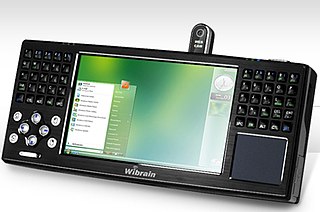
An ultra-mobile PC, or ultra-mobile personal computer (UMPC), is a miniature version of a pen computer, a class of laptop whose specifications were launched by Microsoft and Intel in Spring 2006. Sony had already made a first attempt in this direction in 2004 with its Vaio U series, which was only sold in Asia. UMPCs are generally smaller than subnotebooks, have a TFT display measuring (diagonally) about 12.7 to 17.8 centimetres, are operated like tablet PCs using a touchscreen or a stylus, and can also have a physical keyboard. There is no clear boundary between subnotebooks and ultra-mobile PCs, but UMPCs commonly have major features not found in the common clamshell laptop design, such as small keys on either side of the screen, or a slide-out keyboard.
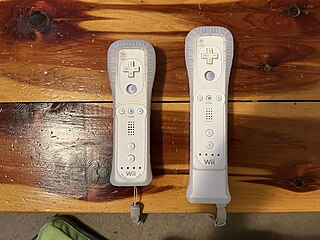
In computing, a motion controller is a type of input device that uses accelerometers, gyroscopes, cameras, or other sensors to track motion.
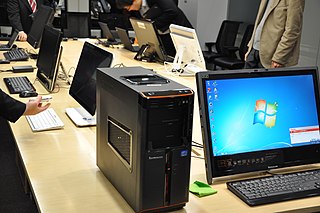
The Lenovo IdeaCentre is a line of consumer-oriented desktop computers designed, developed and marketed by Lenovo. The first IdeaCentre desktop, the IdeaCentre K210, was announced by Lenovo on June 30, 2008 as a consumer-focussed alternative to the business-oriented ThinkCentre and ThinkStation brandnames acquired from IBM. While the IdeaCentre line consists entirely of desktops, they share a common design language with the IdeaPad line of laptops and hybrids. One such feature is Veriface facial recognition technology.
The IdeaPad tablets from Lenovo were a brand of consumer-oriented tablet computers designed for home use or entertainment, as opposed to the business-focused ThinkPad Tablet series. Devices sold in certain countries, such as China, India and New Zealand, were sold under the LePad brand, similar to the LePhone series of smartphones. IdeaPad-branded tablets have been produced with the Android and Windows operating systems.

The Nvidia Shield Portable is a handheld game console developed by Nvidia, released on July 31, 2013. It runs on Android Lollipop 5.1, featuring a flip 130mm (5-inch) touchscreen display with 1280×720 resolution. It is similar in shape to an Xbox 360 controller and similar in control setup to a DualShock controller, with two analog joysticks, a D-pad, and other buttons. It is the first device to use Nvidia's Tegra 4 processor. It was originally called Shield or Nvidia Shield, but since the launch of the Shield Tablet, it is called the Shield Portable.

Steam Machine is a discontinued series of small form factor gaming computers by Valve, designed to operate SteamOS to provide a game console-like experience. Several computer vendors were engaged with Valve to develop their own versions of Steam Machines for retail, offering additional options atop Valve's requirements such as dual-booting options with Microsoft Windows and the ability to upgrade the computer. Consumers could digitally purchase video games on their Steam Machine through Valve's namesake Steam storefront.
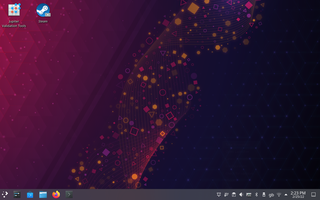
SteamOS is a Linux distribution developed by Valve. It incorporates Valve's popular namesake Steam video game storefront and is the primary operating system for the Steam Deck, Valve's portable gaming device, as well as Valve's earlier Steam Machines. SteamOS is open source with some closed source components.

Windows Mixed Reality (WMR) is a discontinued platform by Microsoft which provides augmented reality and virtual reality experiences with compatible head-mounted displays.

GPD Win is a Windows-based palmtop computer equipped with a keyboard and video game controls. It is an x86-based computer that runs Windows 10. It is capable of running any x86 Windows-based application that can run within the confines of the computer's hardware. First announced in October 2015, it was crowdfunded via Indiegogo and two other crowdfunding sites in Japan and China. The GPD Win was released in October 2016.
The ninth generation of video game consoles began in November 2020 with the releases of Microsoft's Xbox Series X and Series S console family and Sony's PlayStation 5.

The Evercade is a handheld game console developed and manufactured by UK company Blaze Entertainment. It focuses on retrogaming with ROM cartridges that each contain a number of emulated games. Development began in 2018, and the console was released in May 2020, after a few delays. Upon its launch, the console offered 10 game cartridges with a combined total of 122 games.

The Steam Deck is a handheld gaming computer developed by Valve and released on February 25, 2022. The device uses Valve's Linux distribution SteamOS, which incorporates the namesake Steam storefront. SteamOS uses Valve's Proton compatibility layer, allowing users to run Windows applications and games. In addition to handheld use, the Steam Deck can be connected to a TV or monitor through a docking station and be used like a desktop computer or home video game console. In desktop mode, users can install third-party applications for Linux.

Ayaneo is a Chinese brand of handheld gaming computers and mini PCs using the Microsoft Windows operating system and AMD Ryzen processors.
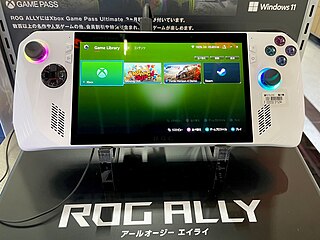
The Asus ROG Ally is a handheld gaming computer developed and manufactured by Asus as part of their Republic of Gamers (ROG) brand. Released on June 13, 2023, the device competes with Valve's Steam Deck. The ROG Ally runs the Windows 11 operating system and uses an AMD Zen 4 processor called the AMD Z1 and Z1 Extreme. In addition to handheld use, the ROG Ally can be connected to a TV or monitor through a docking station or a dongle and be used like a desktop computer or home video game console.